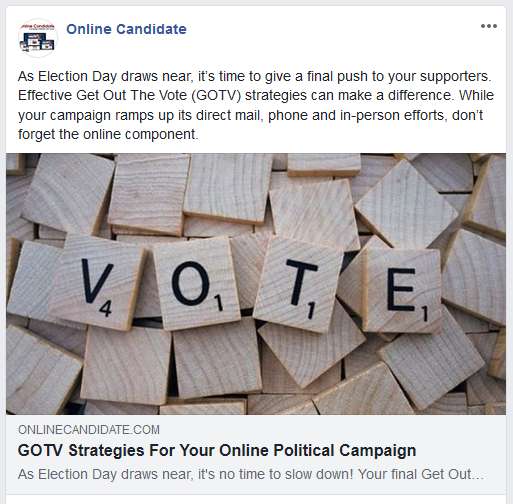4 Pillars For A Solid Political Digital Strategy
 As online political campaigning has grown in recent election cycles, it has also become more complex. If you take your cues from recent presidential campaigns, you’ll think that you will need a deep and extensive online operation.
As online political campaigning has grown in recent election cycles, it has also become more complex. If you take your cues from recent presidential campaigns, you’ll think that you will need a deep and extensive online operation.
Truth is, many local campaigns are not prepared to manage a large online presence.
First-time candidates often have little experience with online marketing. Small political campaigns have limited time, resources – and often little experience to run an offline ground game. That’s why it’s important to have a clear, focused plan for a digital strategy.
There are four major pillars to creating an effective political campaign digital strategy. Each element is important, but when combined they are even more effective in building online support.
Social media strategies
You are going to want to start building your online presence early, long before you start your candidacy. If you’ve never spent much time online, it’s a good idea to start reaching out with social networking. Facebook and Twitter are a good start. Create personal profiles, reach out to friends and start interacting a bit.
Having an online network of supporters in place gives you a leg up when you announce your intention to run for office.
When coming up with a digital strategy for your political campaign, you’ll find a large number of social media platforms to choose from. It’s easy to get caught up in trying to be everywhere – so don’t. Unless you have the staff and resources, it’s better to keep your online presence focused. Local campaigns should stick with established social media platforms: Facebook, Twitter and YouTube.

- Social media is instrumental to engage voters on a personal level. It can help you promote events and to drive traffic to your campaign website. Social media also allows politicians to circumvent traditional paid advertising or earned media.
- Don’t wait to start learning. Open your own personal social media accounts. Learn how to join groups, find friends and interact on the platforms. That will make it easier for when you use them for your political campaign.
- You will need to pay for the privilege to reach your followers. Facebook, for example, will only allow a tiny percentage of followers to see your posts. You can get around this, of course, by paying to promote your posts.
If you decide to use social media in your campaign, you must remain active. That means making regular posts and active outreach to others. Journalists often follow candidate’s social media accounts. Creating accounts and abandoning them is worse then having never created them at all.
Email communication
Email is one of the most powerful tools a local campaign can use. It can help your campaign keep in touch with supporters throughout the campaign. Email can affect both your online and offline success. A good use of email can help rally volunteers, improve donations and enhance your GOTV efforts.

Campaign is email is different than personal email in several ways. First, it is impossible to manage a campaign email list through a personal email account. Maintaining subscribers and segmenting large email lists requires automation.
Email marketing vendors offer advanced tools and functionality, including:
- Mail merge: You can insert the member’s name, email address, or other information into the text of the message.
- Automatic subscribe and unsubscribe of email addresses.
- Automatic error processing: Bad email addresses are flagged and removed from the list.
- Trackable URLs: You can track how many people click on the links in your emails. This feature can be useful in determining the effectiveness of your messages.
There are many email vendors that can serve your needs. Some services, like Mailchimp and Aweber, are free for smaller lists. This can be a great option for local campaign.
Expect to incur some costs, though, as your subscriber numbers grow.
Political online advertising and digital marketing
If you want online exposure, you will need to pay for it. Dedicate a percentage of your promotional budget for online advertising.
The three most common forms of online advertising for local campaigns include:
- Social media adverting: Compared to television, advertising on social media platforms is inexpensive. It also allows you to target segments of people more directly.
- Pay Per Click advertising: PPC through Google is one of the easiest ways to target users and deliver traffic via search engines. You pay each time someone clicks an ad that appears for particular searches. Target your location, name and issues.
- Retargeting: Keep your campaign brand front and center. Show display advertisements to people who visit your campaign website.
- IP Target Marketing: Reach specific households by physical address. Home addresses are converted to IP addresses so you can display ads across all devices in that location. The ads appear through popular ad networks and show on millions of popular websites.
- Other online marketing includes direct ad buys on local websites, such as newspapers.
For campaigns with limited budgets, make sure that you properly budget for digital. While online advertising can range from the inexpensive to the ridiculous, you’ll want to know early on how much you can dedicate to digital marketing. Don’t forget to budget for a large push near Election Day.
Build a campaign website
The forth pillar acts as the ‘hub’ of your online campaign. You will need to build a campaign website.
First, these days voters expect political campaigns to have a website.
When voters search for you online, you’ll want your site to rank at or near the top of the search results. Doing this requires good site content and links.
And a great place to get those links is from your social media accounts. We’ve found over the years that sites with social media accounts tend to start ranking for candidate names and races faster and easier than sites without these links.
Limiting your exposure to social media limits your ability to reach all voters. Not everyone uses or follows social media.
A website provides informational platform and a place to reference in your advertising. The domain name that you choose acts as your ‘brand’ name. Your website should be linked to from your social media accounts and on your offline print material.
When people search for you, you want your website to appear in the top search results. It may well be the first place that people read about you online. On your website, you can present your message without filters or distractions.
Post position papers, press releases and extra information. You can even add an online press kit for journalists to access.
Through your campaign website you can grow email subscribers, recruit volunteers and raise donations.
Don’t Wait!
The Internet is not a substitute for ‘traditional’ campaigning. Use online efforts to promote offline events. You can also encourage online participation in many ways. For example, you can post ‘live’ during your campaign events. Attendees can be asked for their email addresses when they arrive. Encourage them to follow the campaign through social media for future updates.
Online Candidate can help you build the pillars of your online campaign. We provide affordable political website design and marketing services. Contact us today!
Easy Link Building Tips For Your Political Campaign
We are often asked how quickly a new campaign website will appear on the search engines. Sometimes this question is asked before the site is even built!
 If you are worried about getting your campaign site indexed int the search engines, you can relax. The major search engines do not require submissions at all. Your campaign websites will be found and indexed through outside links to your site.
If you are worried about getting your campaign site indexed int the search engines, you can relax. The major search engines do not require submissions at all. Your campaign websites will be found and indexed through outside links to your site.
The next question then is how to get does one get those outside links, and how many are needed. When it comes down to it, a single link is all the search engines need to find any website or web page. How fast they find that page depends on the quality of the pages linking back. If a link is buried deep on a site that itself is not very popular, then it might take some time for the links to be discovered.
Easy ways to build links to get search engines index to your website:
- Add analytics to your website. Creating a Google account and adding analytics to your website will get your site discovered by Google quickly. Whether it ranks or not is a different story, however. We recommend having at least 5 pages of content on your site, such as your site home page, issue and about the candidate pages.
- Create social media accounts. Creating social media accounts for your campaign and having them link back to your website is a great way to get a few high-powered, relevant links. Not only does this help your website rank for relevant searches, but your Facebook and Twitter accounts will tend to rank as well.
- Press Releases: Create a press release announcing your campaign and submit it to free online press release websites, such as PRLog.org and free-press-release.com
- Share your website to your local media outlets: Newspapers will often create local candidate bios as election time nears. This material is usually online. The downside to this technique is that there may only be a short window of publication time.
These methods will help optimize your website for search. Number one and two should get your site indexed fairly quickly, possibly within days. Avoid paid services or links back from questionable websites.
Do not ‘go live’ or start building out links until your website – or at least your site homepage – is ready for visitors. If your site in indexed too early, you may find that your initial search engine listing might not be very good. You could find that your search engine listing shows a temporary title with an ‘under construction’ description. This will remain in place until your site is crawled again. For new sites, sometimes that can take weeks.
New links to your site trigger search engines spiders to return to your site sooner than they might otherwise.
Related: Political SEO Strategies
What are the Elements of an Online Political Campaign?
Today, even the most local political campaigns are finding that an online presence is critical to election success. Traditionally strong candidates can be outclassed by opponents who simply run a better online campaign. Knowing the opportunities and taking advantage of them will improve your chance of success.
Here’s a quick overview of the basic elements of an online political campaign:
Your Online Reputation as a Candidate
When you start a local political campaign, keep in mind the information that voters will encounter about you. Your online reputation is what people are saying and seeing about you online. It’s the information that is found when anyone searches about you or your campaign.
As a candidate running for office, you will want influence over what people see, hear and read about you on the web. To do that, you need an online identity. For political purposes, that means creating a personal brand. That means getting yourself – your history and goals – out on the web. This is done by creating identities on social networks, creating a campaign website, active online engagement, and generating positive buzz.
The ultimate goal of building an online identity is search result page domination. This means that when someone searches your name, they will find positive information about you in the top search results.
Your Campaign Website
By starting a political campaign website early, you can raise campaign seed money that much faster. A website set up for donations makes it easier for donors to contribute. Someone is more likely to quickly click and donate than to write out a check, put it in an envelope, and mail it out.
[bctt tweet=”Starting a campaign website and social media presence early helps establish your online ability to raise critical seed money. http://ow.ly/VPlH30gBifO”]
Online political campaigning is a multi-faceted effort. Having a central location to promote the different elements of your campaign comes is important. A website with a good domain name is standard for just about any political candidate today.

Your Social Media Presence
Signing up for X/Twitter, Facebook, LinkedIn, Instagram and every social network you can find is a recipe for disaster. Building a consistent presence on multiple social sites is hard work. You might not be able to keep up with all of them. It’s best to start by only tackling a couple at first – and sticking with them.
Building an online social network before you start your political campaign gives you a leg up when you announce your intention to run. The payoff is that your group of friends and fans will be the first to check out your campaign website, provide feedback on it, help promote it, and perhaps even help in your fundraising and volunteer efforts.
[bctt tweet=”Start your online network long b4 you launch your political campaign. http://ow.ly/VPlH30gBifO”]
Email – Still the ‘Killer App’
Despite the popularity of social media, email is still the ‘killer app’ of online campaigning. A multifaceted online push is the most effective way to build support. By starting early, you can accumulate more e-mail addresses from supporters. Using email to keep in regular contact helps get your word out and keeps supporters informed.
If you plan to use email extensively, use an email marketing service. Your ISP will not allow you to send mass emails from personal accounts. Email services have arrangements with ISP that allow for better delivery rates. They also have tools that allow people to automatically add and remove themselves from your email list. By using more advanced techniques such as split-testing, you can target your messages better and achieve a better response rate.
Online Advertising
Your campaign website, social media and email campaigns are all promotional methods, but paid social media exposure (like Facebook ads), pay-per-click, banner advertising on popular local sites, text messaging and targeted online ads help get the word out. Be sure to budget for online advertising expenses from the start – and save a portion of the budget for your GOTV strategy.
[bctt tweet=”Budget for online advertising expenses in your political campaign, particularly for major announcements and #GOTV.”]
Kind of Online Advertising (But Not Exactly)
This includes SMS/texting campaigns. Text messaging has a high delivery rate and is fairly simple to set up. Once you create an account with a short message service (SMS), you will be able to pick a Keyword for your campaign. People then opt-in by texting that Keyword to a particular number. (Ex: Text SMITH4GOV to 555432) Text alerts can then be sent to all subscribers on the list. You can begin a mobile texting push with a small budget.
Of course, you will want to tie all of these elements into your online fundraising, support building, and GOTV efforts.
Making a successful run for office isn’t easy. It takes a multifaceted effort. With the majority of voting adults online in one way or another, even local politicians should take the time and resources to promote themselves online.
After all, only your election victory hangs in the balance!
Our candidate web page design services makes building your online presence as quick, affordable, and pain-free as possible.
Tracking Your Political Advertising Campaigns
 How do you know that the money you are spending with your online political advertising is worth the investment?
How do you know that the money you are spending with your online political advertising is worth the investment?
Tracking your marketing campaigns is crucial to understanding where your website traffic comes from and what elements of your political marketing are working best. Simply sending traffic to a landing page on your campaign website without knowing how well that traffic converts is a waste of time and money.
Use tracking links with your political advertising
Tracking URLs are essential if you are advertising via email, Pay Per Click advertising, ads on other websites or via retargeting campaigns. By properly creating tracking URLS from your different traffic sources, you’ll be able to report on multiple elements of your advertising campaign, right down to a granular level.
With the proper tracking urls, marketers and campaign can know which of their advertisements are working to bring in more visitors. By knowing which of their ads are working best, they can improve their strategies and make necessary changes to maximize return on investment (ROI).
All this means is that you append your regular advertising link with some additional items.
Here is a sample tracking link that works with Google Analytics:
https://www.yourcampaignwebsite.com/?utm_source=fundraising&utm_medium=email&utm_campaign=summer-drive&utm_content=Fundraiser-Form1
- Source – Used to differentiate the type of medium. This is the most ‘broad’ element of your tracking. It may be fundraising, donation solicitations and so on.
- Medium – This is the medium used to send your campaign. Include “email” for an email campaign, “cpc” for ads, “social” for a social network or “landing-page” if you’re tracking button clicks from a landing page.
- Campaign -The name of your overarching campaign – e.g. spring-2016-fundraiser or summer-2016-advertising. Be sure to follow a consistent campaign naming structure.
- Content – This is essentially a bonus field and is the most granular. It can be used to track many differentiating factors for your campaign. For example, you can use this field to track different versions of your email or landing page – e.g. “email-version2” or “fundraiser-July15”.
Google even provides a simple tool for creating tracking links. You can find it here: https://support.google.com/analytics/answer/1033867?hl=en
You can use tracking links on a variety of online marketing services, including:
From there, you can track how well your traffic performs. You can determine what each advertising channel provides in:
- Visits
- Donations
- Volunteer signups
- Conversions for polls, surveys, etc.
Why your advertising numbers may differ
You may find that the numbers provided from your advertising service provider or vendor differ from what you are tracking from your own website analytics. The answer is simple. The vendor tracks clicks directly from their end. However, when the visitor arrives at your campaign website, they may not appear in the analytics due to ad blockers. They prevent the tracking code from loading, so the visitor is rendered ‘invisible’. It doesn’t mean the visitor didn’t see the page or interact with the site or even sign up for something, it just means their visit (and possible conversion) might not be properly track
Need help getting Google Analytics set up for your campaign website? Our Site Launch Service includes Google Analytics and Google Webmaster setup to help your campaign get an initial promotional boost to rank well in the search engines. This service can be added as a Website Option or ordered when you are ready to launch. View our full website packages and optional add-on services.
5 Assumptions That Will Tank Your Campaign Website
 Here are common assumptions that can cause problems for political campaigns. These issues can apply to those who already have campaign websites or are looking to start one.
Here are common assumptions that can cause problems for political campaigns. These issues can apply to those who already have campaign websites or are looking to start one.
Assumption 1: You don’t need a campaign website.
More and more, with the rise of social media, the role of the campaign website has shifted from being the bulk of a candidate’s online presence to more of a hub. But the website is still critical, both from an online presence, and as a brand to point to with your offline advertising. While the campaign website contains the core message and branding, people follow candidates and campaigns through a variety of methods – from blog feeds to Facebook and Twitter updates.
Online politics has expanded greatly over the last decade. The web is where voters look for candidate information. In short, voters expect candidates to have a website. If you don’t have your own voice online, then someone else is doing the talking about you.
Assumption 2: Your website will be the first search result when someone types your name.
Go ahead, ‘google’ yourself. Type in your name and search for your name. What shows up? Maybe you share a name with someone else, and links about that person are showing up. Maybe it’s an unflattering newspaper article or blog post?
Do you want to have a say in what shows up on those results? Well, you can.
One reason why we recommend using a candidate’s name as a domain name is that it goes a long way in making that website relevant for the candidate’s name searches. Even if there isn’t much content on the site, the fact of having a domain name that includes the candidate’s name will help it to appear for searches of that name.
You’ll often see a candidate’s Facebook, Twitter and LinkedIn pages in the search results. These pages tend to appear nowadays because those domains are considered strong and authoritative to the search engines.
If you want to help ‘push’ certain web pages or sites up the search results, you may need to give a little ‘link love’; that is, point links to those pages. For example, to build links to your campaign website, you’ll want to link to the site from your Facebook and Twitter profiles, from supporter’s websites, and from other political sites. You’ll also want to link out to your social media pages from your website, as well.
Assumption 3: People already know about you.
Believe me, they don’t. How many people do you know that can name their congressperson or state representative? One thing we suggest to candidates is that they include enough information about themselves and their race. The ‘who, what and where’ must be immediately picked up by your site visitors. We’re always amazed when we see local campaigns sites that don’t expressly state what they are running for, and where.
“Vote Smith for Mayor.”
Smith who? Mayor of where? Vote when? People should be able to know within a second or two if your campaign matters to them. If they can’t figure it out right away, they won’t stick around to guess.
For all the talk about interactivity and social media, your campaign website is the perfect place to make that initial introduction. The reality is that many voters simply don’t know you – yet.
Assumption 4: Visitors already support you.
Depending on the race, there are likely a block of independent or undecided voters who can swing an election either way. While ‘red meat’ partisan attacks may play well to a base, it will likely turn off some voters. Just because Washington, DC is hyper-partisan doesn’t mean that the average voter is looking for that in their local elections. In fact, most independent voters are turned off by excessive partisanship.
Assumption 5: Your website will become your campaign’s ATM.
If you set up a campaign website for the sole purpose of raising campaign contributions, there’s a good chance you will disappointed.
A website CAN produce significant revenue, but only if your campaign is capable of attracting donors in the first place. The campaign website should inform and persuade first. Allow people to follow your campaign through email and social media. Promote your site offline as a way to contribute toward your campaign. Build trust and rapport, which is the key to opening donor’s wallets.
Looking for letter templates that cover all aspects of a local political campaign? Save time and effort with our Campaign Letter Templates. Visit our Download Store for more digital items.
Social Media Hacks For Your Political Campaign
Campaigning online is no simple task, especially for political campaigns and non-profit organizations with limited means. However, focusing your efforts and cultivating followers on specific platforms can pay off come Election Day.
Politicians use social media to help recruit volunteers and raise money. It also helps strengthen the political base. Local candidates sometimes wonder if social media can be used for their own election campaigns. It doesn’t matter if you are running for federal, state or local office, a successful political social media strategy can be achieved at any level.
The tactics may be vary depending on the race you are involved with, but with the majority of voters engaged in social media, it is important to make an effort to reach out to them online.
Here are ideas that will boost your campaign’s social media strategy.
Get Your Campaign Authorized
Before you can begin any political social media marketing, you will want to have your campaign verified and authorized. To provide greater transparency, Facebook, Google and Twitter now require user verification.
Verification allows social media users to easily identify ads that deal with politics, to know who paid for them, and whether the ad was authorized by a candidate or campaign.
One downside to the authorization process is the time it can take. Give yourself a few weeks to become authenticated. You will be snail-mailed verification cards to confirm your address. Don’t wait until the last minute to request your confirmation postcard. Otherwise, you might not be able to run your campaign advertising.
Don’t Just Rely On Facebook Posts
Using social media for political campaigns is more than just broadcasting a message and hoping someone sees it. With declining Facebook reach for individual Page posts, you may want to test the water with Facebook advertising. The can expand your reach to followers, friends of followers or others based on specific demographic criteria such as by location, age or interests.
To boost a specific post, click on the Boost button from any of your posts, or you can log into the Facebook Ads Manager and step through the process there.
In terms of cost, Facebook ads are affordable. You can start an ad campaign for as little as five dollars. You can increase spending as you focus on reaching more potential supporters. Build your audience throughout the campaign and target them for specific events and GOTV efforts.
Use Images With Your Social Media Posts
As social media has become more visual, Facebook, LinkedIn and Twitter are more image-friendly than ever. Adding a picture with a post will take up more space and help capture attention from viewers.
If you are sharing a blog post or web page, an image is usually pulled in from the source. If not, use a new engaging image and attach it to your update. Real campaign photos work better than stock images. You can even edit images online using tools like Pablo.

While we are on the subject of images, make sure that all of your social media profile headers incorporate your campaign or party’s colors and fonts into the page design. While Facebook, Twitter and YouTube all have different dimensions, your header images should have a similar look and feel. You want to brand your political campaign across the web, and even into the real world with your signage and print material.
Use Video To Promote Your Campaign
 With the ability to record video from just about any phone, there is no reason not to include engaging video content in your social media mix. Create a campaign YouTube channel to host your videos in once central location. Instagram, Twitter, and Facebook allow for video posts. However, it is best practice to directly upload video to those other channels than to embed a YouTube video link into your posts. You will get more initial exposure on those platforms in this way.
With the ability to record video from just about any phone, there is no reason not to include engaging video content in your social media mix. Create a campaign YouTube channel to host your videos in once central location. Instagram, Twitter, and Facebook allow for video posts. However, it is best practice to directly upload video to those other channels than to embed a YouTube video link into your posts. You will get more initial exposure on those platforms in this way.
Add Your Social Media Info To Your Email Signature
Every personal and campaign email you or your campaign staff send is an opportunity to mention your social media profiles (and website). Add social media links into your email signature.
Post Updates From The Right Account
This is a big one. Make sure you and your campaign staff keep personal and campaign social media posting separate. Personal posts sent through official campaign accounts have caused embarrassment for many campaigns. One way to keep everything separate is to use a separate browser for just campaign posts. That way you don’t even have to worry about logging in or out of different accounts.
Ask Your Fans And Followers For Help
It’s not enough just to have followers. You need your followers to help increase growth and engagement. On Facebook posts, ask for comments, likes and shares. For Twitter, ask your followers for retweets. The key is to make the right call to action. If your post is about raising money, ask specifically for a donation. If you are looking for volunteers, ask your followers to go to the signup form and register. Be specific. Never assume that someone will just know what to do.
Use Social Listening To Track The Conversation

Social listening tools lets you follow social conversations about the candidates, the election itself and various related issues. There are several services that do this, such as Mention and SocialMention. Hootsuite also has a social monitoring platform.
A few items to track include:
- Your campaign and candidate name, including alternate spellings or misspellings.
- Your opponent’s names.
- Slogans, taglines, or mottos.
- Other keywords or phrases relevant to your campaign.
Unfortunately, none of the tools listed above are comprehensive. They catch part of what is out there but don’t always pick up every relevant link or mention. It’s a good idea to use multiple services to track online mentions.
You can also use social listening to keep track of your opponents. Politics moves fast on the web. You must be prepared to act and react quickly when something important happens.
Hopefully, these tips have given you some ideas for putting together your own campaign social media strategy.
Politicians of all parties have come to understand the value of an online presence. It is a powerful tool to speak directly to voters and supporters. It can also be used to influence voter turnout and help improve your chances for Election Day victory.
With our affordable website packages, why wait to start your online campaign? Your domain, hosting and content platform are all included to make building your web site as pain-free as possible.







